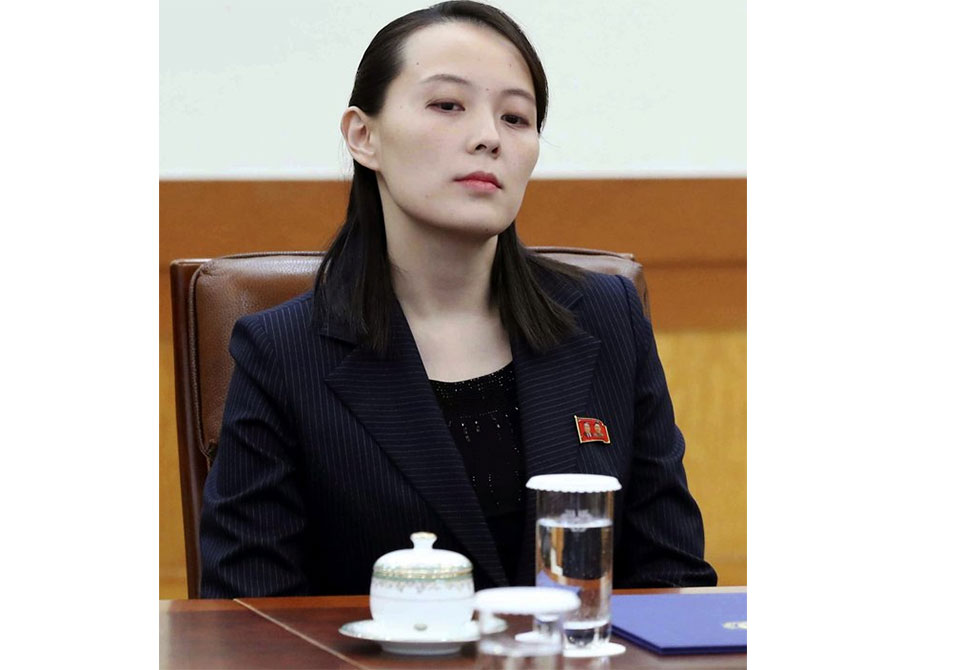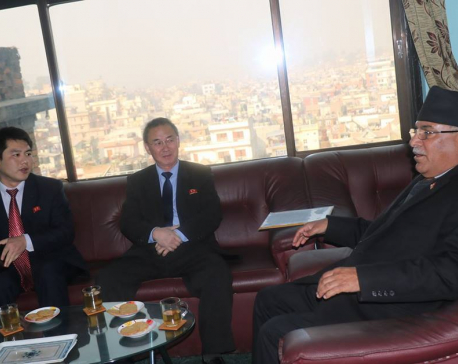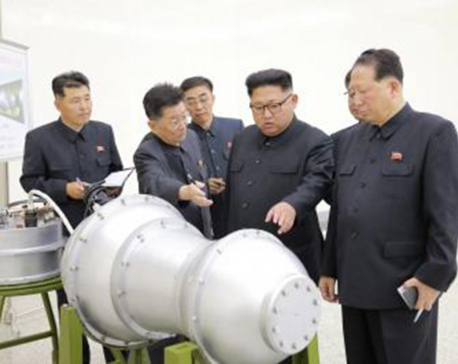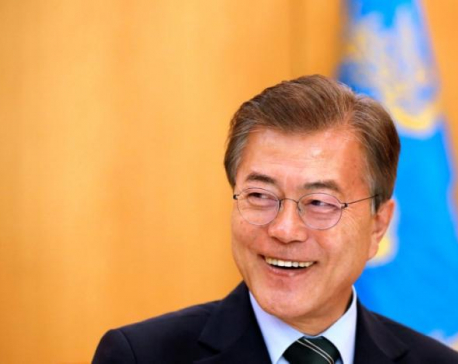
OR
Come visit: South Korea’s leader invited to North Korea
Published On: February 10, 2018 04:20 PM NPT By: Associated Press

PYEONGCHANG, South Korea, Feb 10: A rare invitation to Pyongyang for the South Korean president marked Day Two of the North Korean Kim dynasty’s southern road tour Saturday, part of an accelerated diplomatic warming that included more handshakes, some Korean liquor over lunch and the potential shared joy of watching a “unified” Korea team play hockey at the Olympics.
Nothing has been settled on any trip north by South Korean President Moon Jae-in. But the verbal message to come at a “convenient time” from dictator Kim Jong Un, delivered by his visiting little sister, Kim Yo Jong, is part of a sudden rush of improving feelings between the rivals during the Pyeongchang Olympics. The result: a heady, sometimes surreal, state of affairs in a South Korea that has seen far more threat than charm out of the North.
Still, it wouldn’t be South Korea if people weren’t asking the perennial question when it comes to North Korea changing gears and showering its rival with apparent affection: What’s in it for Pyongyang?
Past “charm offensives” have been interpreted as North Korea trying to recoup from crippling sanctions on their nuclear program, or trying to drive a wedge between Seoul and its U.S. ally.
A massive military parade in Pyongyang on the eve of the just-opened Pyeongchang Games has been used as Exhibit A by skeptics: In it, Kim Jong Un highlighted several huge intercontinental ballistic missiles, which were successfully flight tested three times last year and could reach deep into the U.S. mainland when perfected.
Even so, there’s also cautious optimism, or curiosity at least. If peace isn’t imminent, a summit in Pyongyang between Moon and Kim Jong Un seems better to most than the threats of recent months.
Moon spokesman Kim Eui-kyeom said Saturday that Moon told Kim Yo Jong that the North and South should continue to build conditions for a summit. The U.S. and the North should quickly resume dialogue, he said.
The lunch Saturday at Seoul’s presidential mansion between Moon and Kim Yo Jong is the most significant diplomatic encounter between the rivals in years. The night before, Kim Yo Jong and other North Korean delegates attended the opening ceremony of the Pyeongchang Winter Olympics, watching a “unified” Korean team march under a banner showing an undivided Korean Peninsula.
In a surreal mixture of dignitaries, the Olympic Stadium’s VIP box included Kim Yo Jong and North Korea’s nominal head of state, Kim Yong Nam, sitting above and behind U.S. Vice President Mike Pence and fellow hardliner Shinzo Abe, the leader of Japan. Pence and the Kims seemed to go out of their way not to acknowledge each other.
That was not the case with Moon — either at the games, when he enthusiastically reached up to shake Kim Yo Jong’s hand, or at the lunch the next day.
South Korean television showed its smiling president entering a reception room Saturday and shaking hands with the North Koreans.
The public part of the talks was mostly about the weather: Pyeongchang was colder than Seoul, it was agreed.
“You went through a lot of trouble braving the cold until late” last night, Moon told the North Koreans, referring to their attendance at the frigid opening ceremonies.
After sitting at a table, Kim Yo Jong placed a blue document folder in front of her. She later gave that folder to Moon, and Moon’s office it was her brother’s personal letter to Moon; officials didn’t reveal what was written in it. Moon’s office said Kim Jong Un’s invitation to visit was delivered verbally by her sister.
After their meeting with Moon, the North Korean delegates got on a bullet train to Gangneung, a coastal city that hosts the skating, hockey and curling events during the Olympics. Moon and Kim Yong Nam, North Korea’s 90-year-old nominal head of state, were expected to attend the debut of the inter-Korean team at the women’s ice hockey tournament Saturday night; it was unclear whether Kim Yo Jong would also attend.
Moon is eager to use Kim’s presence at the games to restore regular communication with North Korea and eventually pull it into nuclear talks. Many in Seoul, however, while interested in the warming high-level contacts, are also tempering expectations for a real breakthrough.
There’s worry too that the proposed summit Pyongyang may come with preconditions — a North Korean specialty. A big one could be a demand to cease the U.S.-South Korean war games that North Korea claims are preparation for invasion. They start in March, and Washington has so far been adamant that they are crucial.
But Moon, a liberal who has always wanted to engage the North, will also have to convince a good portion of his own people who are deeply wary about North Korean intentions. Throw in there the accusations that South Korea has had to arrange huge payouts for past meetings, and that these earlier encounters, while certainly producing indelible images, have done little to slow North Korea’s pursuit of nuclear weapons.
After the threats, missile launches and general nastiness from the North over the last year, there is still a lot of anger, fear and skepticism in the South. No amount of handshakes or smiles, or even Korean booze, can remove that.
Even if there are more meetings between the rivals after the games, to discuss the nuclear standoff, to discuss ways their militaries could ease friction, accomplishing something is another matter. South Korea wants a northern neighbor without nukes; North Korea vows to keep its weapons until the United States discards its “hostile” policies against the country.
Hours before Friday’s opening ceremony in Pyeongchang, Japan’s Abe warned Moon not to fall for North Korea’s “smile diplomacy” during the Olympics, according to Moon’s office. Pence carried a similar message.
“Kim Jong Un is clearly serious about reviving talks with the South to improve relations. He sent the country’s nominal head of state and also his sister Kim Yo Jong to Seoul and they would need to have something to show for it when they return home,” Koh Yu-hwan, a North Korean expert at Seoul’s Dongguk University and a security adviser to Moon, said.
“It seems clear,” he said, “that the countries have entered a phase of restoring a regular level of contact.”
You May Like This

Dahal invited to N.Korea, envoy says "South and North Korea in favor of national unity"
KATHMANDU, Jan 21: North Korean Ambassador to Nepal Kim Yong-hak paid a courtesy call on CPN (Maoist Center) chairperson Pushpa... Read More...

South Korea, U.S. plan more drills after North Korea nuclear test rattles globe
SEOUL/WASHINGTON: South Korea said on Monday it was preparing fresh military drills with its ally the United States and ramping up... Read More...

South Korea president calls on China's Xi to do more on North Korea nuclear program
SEOUL, June 22: South Korean President Moon Jae-in said on Thursday China should do more to rein in North Korea's nuclear... Read More...





Just In
- NRB introduces cautiously flexible measures to address ongoing slowdown in various economic sectors
- Forced Covid-19 cremations: is it too late for redemption?
- NRB to provide collateral-free loans to foreign employment seekers
- NEB to publish Grade 12 results next week
- Body handover begins; Relatives remain dissatisfied with insurance, compensation amount
- NC defers its plan to join Koshi govt
- NRB to review microfinance loan interest rate
- 134 dead in floods and landslides since onset of monsoon this year












Leave A Comment